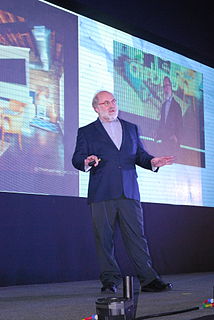A Quote by Glenn Greenwald
The many pro-surveillance advocates I have debated since Snowden blew the whistle have been quick to echo [Google CEO] Eric Schmidt's view that privacy is for people who have something to hide. But none of them would willingly give me the passwords to their email accounts, or allow video cameras in their homes.
Related Quotes
Google's a strange place. When I met Eric Schmidt, he said, "If you are kind to everybody, then you will make good decisions because people will give you good information, and if you are truthful to everybody, they will be truthful to you." That's what's different about Google. They screw up and make mistakes, but they genuinely mean the good stuff about "don't be evil."
Over past years we have seen unrelenting pressure from advocates of homosexuality to accept as normal what is not normal, and to characterize those who disagree as narrow-minded, bigoted and unreasonable. Such advocates are quick to demand freedom of speech and thought for themselves, but equally quick to criticize those with a different view and, if possible, to silence them by applying labels like "homophobic."
Before Sept. 11, the idea that Americans would voluntarily agree to live their lives under the gaze of a network of biometric surveillance cameras, peering at them in government buildings, shopping malls, subways and stadiums, would have seemed unthinkable, a dystopian fantasy of a society that had surrendered privacy and anonymity.
I don't think he would have had any trouble answering Justice Sonia Sotomayor's excellent challenge in a case involving GPS surveillance. She said we need an alternative to this whole way of thinking about the privacy now which says that when you give data to a third party, you have no expectations of privacy. And [Louis] Brandeis would have said nonsense, of course you have expectations of privacy because it's intellectual privacy that has to be protected. That's my attempt to channel him on some of those privacy questions.
Privacy is an age of universal email collection and spying, with millions of CCTV cameras and warrantless spying pervasive; privacy has become virtually nonexistent and, therefore, extremely scarce and desirable. Bitcoin can be a completely anonymous transaction that maintains the user's privacy beyond the reach of any authority.
Snowden has presented us with choices on how we want to move forward into the future. We're at a crossroads and we still don't quite know which path we're going to take. Without Snowden, just about everyone would still be in the dark about the amount of information the government is collecting. I think that Snowden has changed consciousness about the dangers of surveillance.
Since young people would much rather play fast-action, rapidly advancing video games, and gambling laws for slot machines and roulette tables haven't changed much since the 1950s, look for casinos to build large video game tournament centers and allow people to bet on the action, similar to betting on college basketball.
































